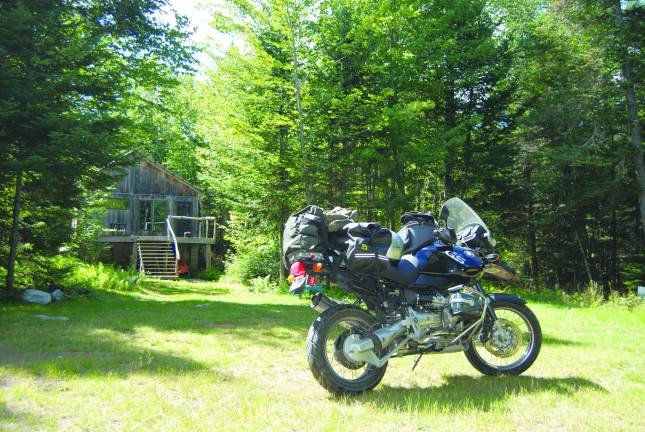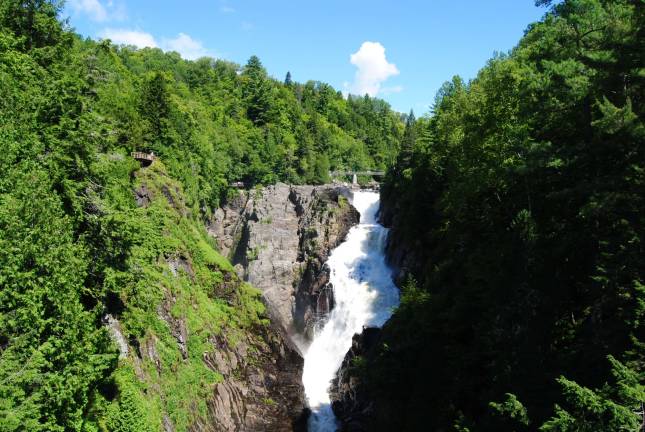Call it a midlife crisis


In July, 2015, I rode my motorcycle to Ottawa to see The Tragically Hip perform at LeBreton Flats. I stood in the rain for two hours with several thousand Canadians who had come to see their beloved band. I was feeling ill, to put it mildly. I had come down with shingles, but didn’t realize it yet. The air was thick with drizzle and reefer smoke; later, the sky let loose. Everybody, it seemed, stayed through the encore. Then the front man, Gord Downie, looked out at the drenched crowd and said into his mic, “Thank you, music lovers!”
I would not wish shingles on anyone, and I realize that getting thoroughly soaked on a cool night does not sound like much fun either. Still, the experience had a kind of transformational effect on me. When I got back to New York, I sought relief from the maddening itch by pacing shirtless around the yard and listening, over and over, to The Hip’s song, “Courage (For Hugh McClennan).”
I got over the shingles. I changed some habits. I became more proactive, and put more discipline into work, thought and reading. A year unfolded. I turned 50; my wife and I sold the family business; my siblings and I reconnected in a meaningful way; we had a rare family reunion and spread my father’s ashes.
The Hip concert had prompted me to read McClennan’s Two Solitudes, a novel that explores the strained, entangled relations between French and English Canadians. McClennan tells the history of the semi-feudal seigneurial system of Quebec, which in turn led me to Henry Thoreau’s A Yankee in Canada. Both books contain engaging depictions of Quebec – the people, the culture, the rivers and the land. Both are examples of the kind of writing that makes you want to hit the road.
Thirteen months after that Ottawa trip, I made another journey north. I set out for Côte-de-Beaupre, a region downriver from Quebec City. I was on a pilgrimage to experience a natural wonder Thoreau had sought out on the Saint-Anne-du-Nord River, a tributary of the St. Lawrence.
Thoreau and a companion hiked two days from Quebec City and then bushwhacked through the forest, “steering by guess and by compass,” to reach Canyon Saint Anne. He described it as “a most wild and rugged and stupendous chasm, so deep and narrow where a river had worn itself a passage through a mountain of rock, and all around was the comparatively untrodden wilderness.” Today, a visit to the gorge requires nothing so strenuous as a wilderness trek; a dead-end road will bring you within a few hundred yards of the park entrance.
There is no need to scramble through brush and over boulders, nor to walk along the slick trunk of a downed tree to get across the shallows above the falls, as Thoreau did. A system of paved trails and bridges offer excellent views of the chutes and the steep terrain on both sides. If you clear your mind and concentrate on the rumble of the falls and the visual impressions – on the awesome power of the river – the gorge pulls you into a kind of trance. I could have stayed there all day. The mists rise, never ceasing, to refresh and sustain the lichens, moss and saplings that cling to the walls. You feel the chill of the chasm, where the sheen on the black rocks never dries or fades. There are hemlocks with U-shaped trunks growing out of cracks in the walls: they began by growing almost upside-down, and then drew such energy from the earth and sun to straighten themselves up and reach for the sky. You listen to the roar of the chutes and wonder if, perhaps, this is the sound of the birth of Time itself.
Thirty hours later, 400 miles away, I completed the last stage of my pilgrimage in another enormous space – not a sacred place, but a hockey arena. It was not built as a venue for meditation, but life and death were on the minds of everyone in attendance. The atmosphere was charged with both joy and sorrow.
I joined 20,000 Canadians to witness the second-to-last concert of The Tragically Hip. Gord Downie, 52, has terminal brain cancer. In the months following his diagnosis, the band recorded a new album and set out on a farewell tour. At the show, I watched the crowd as much as I watched the stage. Canadian fans, who have witnessed this musical brotherhood evolve over 30 years, were in awe of the strength and love that the band put forth as they made their final public journey together. It was an intense, indelible experience.
Thoreau, who died at 44, threw down this challenge in his journal one day: “Nothing must be postponed. You must live in the present, launch yourself on every wave, find your eternity in each moment.” He knew: Time roars by, water through a gorge.